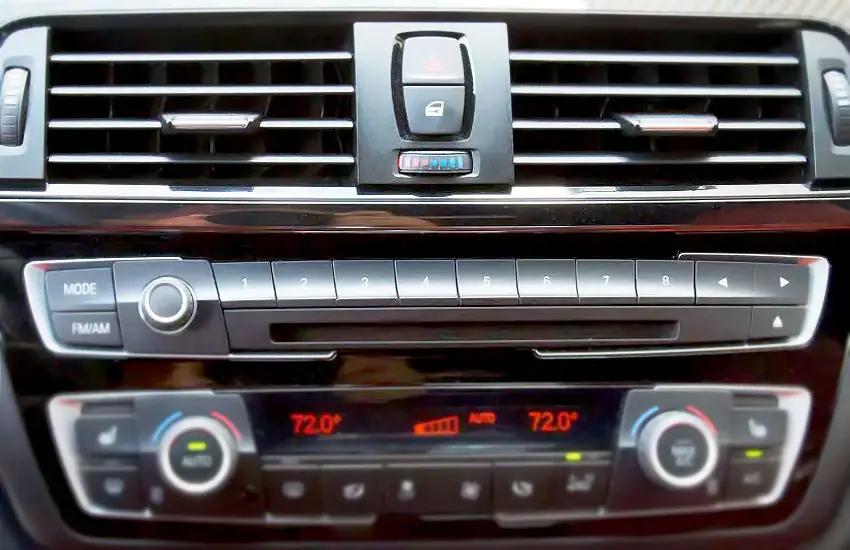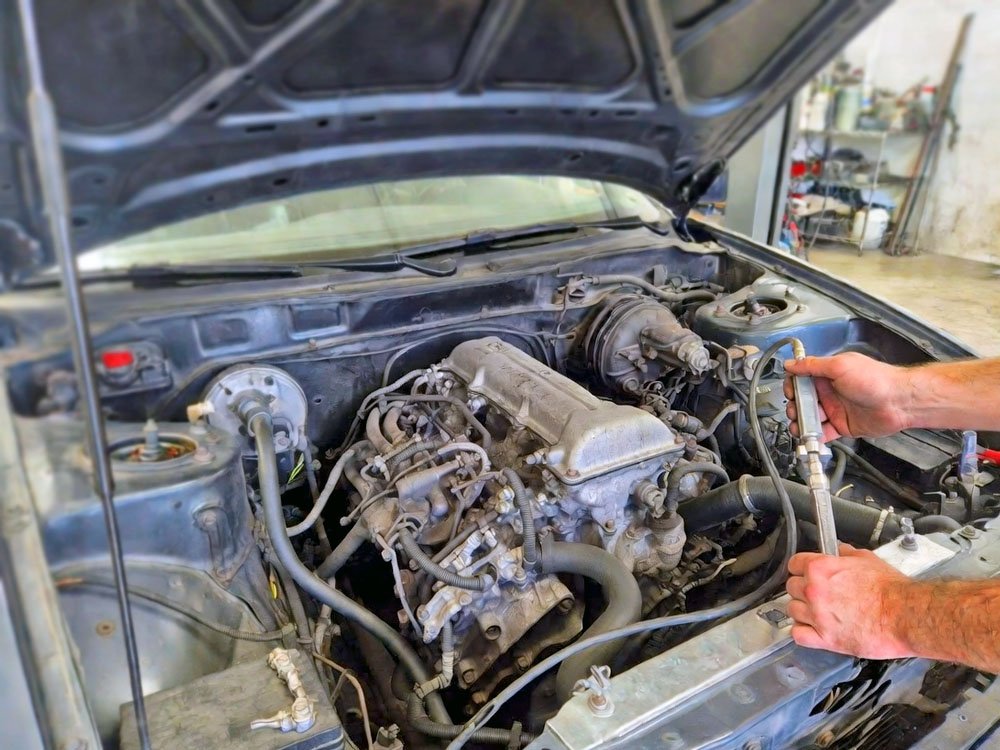You know that frustrating moment when your car’s AC turns on and off for no reason? It’s like the weather’s playing a game with you, and you’re stuck in the middle. Don’t sweat it, though. There are a few common reasons why this might be happening, and fixing them is usually pretty straightforward.
First, let’s figure out what might be causing the problem. It could be anything from a loose connection to a dirty filter or even an issue with the AC system itself. In this article, we’ll go over the common causes and simple fixes for an AC that can’t make up its mind.
Common Causes of Car AC Turning On and Off Randomly
When your car’s air conditioning (AC) system starts turning on and off randomly, it can be quite frustrating. Here are some common causes for this issue:
1. Faulty AC Compressor
The AC compressor is crucial for cooling your car. If it’s failing, it might turn on and off intermittently. This can happen due to internal damage, low refrigerant levels, or electrical issues. If the compressor is the problem, you might notice inconsistent cooling or strange noises.
2. Low Refrigerant Levels
Your car’s AC system relies on the right amount of refrigerant to function properly. If refrigerant levels are low, the AC might turn off to prevent damage. Low refrigerant can be caused by leaks in the system or an insufficient recharge. Regularly checking and recharging refrigerant can help avoid this problem.
3. Faulty AC Pressure Switch
The AC pressure switch monitors the pressure of the refrigerant in the system. If this switch is faulty, it can cause the AC to turn on and off unexpectedly. A malfunctioning pressure switch might not accurately detect pressure levels, leading to erratic operation of the AC.
4. Electrical Issues
Electrical problems, such as damaged wiring or a malfunctioning relay, can cause your AC system to act unpredictably. If there are issues with the electrical components, the AC might turn off randomly or fail to operate correctly. Checking the wiring and relays for any signs of damage can help identify the issue.
5. Broken Blend Door Actuator
The blend door actuator controls the flow of air in your car’s AC system. If it’s malfunctioning, you might experience erratic cooling or heating. A broken actuator can lead to the AC turning on and off unexpectedly as it struggles to regulate the temperature.
6. Dirty or Clogged Cabin Air Filter
A dirty or clogged cabin air filter can restrict airflow and affect the performance of your AC system. When airflow is reduced, the AC might cycle on and off more frequently. Regularly replacing the cabin air filter can help maintain proper airflow and prevent random cycling.
7. Faulty Thermostat
The thermostat in your car regulates the temperature of the AC system. If it’s faulty, it can cause the AC to turn on and off irregularly. A malfunctioning thermostat might not correctly detect the temperature, leading to inconsistent cooling.
8. Engine Overheating
If your engine is overheating, it can affect the performance of the AC system. The AC may turn off to protect the engine from further damage. Keeping an eye on engine temperature and addressing overheating issues promptly can help maintain AC functionality.
Addressing these common issues can help ensure your car’s AC system operates smoothly and consistently. If you’re experiencing persistent problems, it might be best to consult a professional mechanic to diagnose and fix the issue.
How to Fix Car AC Turning On and Off Randomly

1. Check the Refrigerant Levels
To start fixing your car’s AC, you should first check the refrigerant levels. Refrigerant is the fluid that helps your AC cool the air. If it’s too low, your AC might turn on and off randomly. First, pop open the hood of your car and find the AC service ports. These are usually marked with “High” and “Low” labels.
The low-pressure port is where you’ll check the refrigerant levels. You’ll need an AC pressure gauge for this, which you can buy or borrow from an auto parts store. Attach the gauge to the low-pressure port and read the gauge to see if the refrigerant level is too low.
If it is, you might need to add more refrigerant. Before adding more, make sure there are no visible leaks around the AC system. If you find any leaks, they need to be fixed before adding refrigerant. To add refrigerant, follow the instructions on the can or the gauge, and make sure you use the type of refrigerant recommended for your car.
Once you’ve added the refrigerant, check the AC system again to see if the problem is fixed. If the refrigerant levels are fine and the issue persists, there might be another problem with the AC system.
2. Inspect the AC Compressor
The AC compressor is a key part of your car’s cooling system. It helps pump refrigerant through the system, so if it’s not working properly, your AC might turn on and off unpredictably. To inspect the compressor, first locate it under the hood. It’s usually near the front of the engine and connected to the AC belt.
Look at the compressor for any obvious signs of damage, like cracks or leaks. Also, listen for any unusual noises when the AC is running. The compressor should engage and disengage smoothly. If you notice that the clutch, which is the part that engages the compressor, isn’t working correctly, it might need to be repaired or replaced.
Check if the compressor is cycling on and off as it should. If it’s not, you may need to have it tested by a professional. Sometimes, the compressor might be damaged inside, which can cause it to malfunction. If everything looks okay but the AC still isn’t working right, there could be another issue with the compressor, and you might need a mechanic’s help to fix it.
3. Test the AC Pressure Switch
The AC pressure switch helps keep the right amount of refrigerant in the system by turning the compressor on and off as needed. If this switch isn’t working properly, your AC might turn on and off randomly. To test the pressure switch, first find it, which is usually located near the AC compressor.
The switch will have wires connected to it, so check these wires to make sure they are secure and not damaged. If the connections seem loose, try reconnecting them. If you suspect that the switch is faulty, you might need to replace it. A new pressure switch can be found at auto parts stores, and it’s usually not too expensive.
Replacing the switch is often a simple job, but make sure you get the right part for your vehicle. Once you’ve replaced the switch, check to see if the AC is working correctly. If the AC still turns on and off randomly, the problem might be something else in the system, and you might need further diagnosis.
4. Examine Electrical Components
Electrical problems can cause your AC to turn on and off unexpectedly. To check the electrical components, start by looking at the wiring connected to the AC system. Look for any signs of damage, like frayed wires or corrosion. Check the connections to make sure they are tight and not loose.
Next, examine the relays and fuses related to the AC system. Relays help control the electrical current to different parts of the system, and fuses protect the system from overloads. If a relay or fuse is faulty, it can cause the AC to act up. Test the relays and fuses using a multimeter, which measures electrical current.
If any are found to be faulty, replace them with new ones. Sometimes, a problem with the electrical system can be complex, so if you’re not comfortable working with electrical components, it’s a good idea to have a professional check it out. Fixing electrical issues can often resolve random AC problems and help your system run smoothly.
5. Replace the Cabin Air Filter
The cabin air filter helps keep the air inside your car clean by trapping dust and debris. If it gets clogged, it can restrict airflow and make your AC system work harder, which might cause it to turn on and off erratically. To replace the cabin air filter, first find where it’s located in your car. It’s usually behind the glove box or under the dashboard.
Open the glove box and remove it if necessary to access the filter. Take out the old filter and check for dirt or clogging. A dirty filter can reduce airflow and affect the performance of your AC. Install a new filter by placing it into the same slot where the old one was.
Make sure the new filter fits properly and is positioned correctly. Reassemble the glove box or any other parts you had to remove. Replacing the cabin air filter is a simple and inexpensive maintenance task that can improve your AC system’s efficiency and help prevent random cycling issues.
6. Check the Blend Door Actuator
The blend door actuator controls the temperature and airflow in your car’s AC system. If it’s not working properly, you might notice the AC turning on and off randomly or the temperature not being consistent. To check the blend door actuator, you need to find it, which is typically located behind the dashboard.
This might require removing some panels or parts to access it. Once you have access, listen for any unusual noises when you change the temperature settings. A malfunctioning actuator might make grinding or clicking sounds. You can also test the actuator by changing the temperature and observing if the airflow changes accordingly.
If it’s not working right, you might need to replace it. New blend door actuators can be found at auto parts stores, and they are usually straightforward to install. Replacing a faulty actuator can help regulate the temperature and airflow better, fixing the random on-and-off problem with your AC.
7. Inspect the Thermostat
The thermostat in your car controls the temperature of the AC system by regulating the flow of refrigerant. If the thermostat is malfunctioning, it might cause the AC to turn on and off unpredictably. To inspect the thermostat, locate it, which is usually near the engine’s cooling system.
Check to see if it’s working correctly by monitoring the temperature readings and making sure they match what you set on the AC controls. If the thermostat isn’t responding accurately or seems to be stuck, it might need to be replaced. Replacing the thermostat is usually a simple task, but make sure you get the right type for your vehicle.
After installing a new thermostat, check to see if the AC system operates more consistently. If the problem persists, there might be another issue with the AC system that needs further investigation.
8. Address Engine Overheating
Sometimes, if your engine is overheating, it can affect the performance of the AC system. An overheating engine might cause the AC to turn off to protect the engine from further damage. To address this, first check the engine temperature gauge on your dashboard. If it shows that the engine is running hot, you need to investigate further.
Look for any issues with the cooling system, such as low coolant levels, leaks, or a malfunctioning radiator. Make sure the coolant is at the right level and add more if needed. Check for any leaks in the radiator or hoses and repair them if necessary. If the radiator isn’t working properly, it might need to be flushed or replaced.
Addressing these cooling system problems can help lower the engine temperature and allow the AC system to function properly. If you’re not comfortable with these checks or repairs, it’s best to consult a professional mechanic to ensure everything is fixed correctly.
I hope this guide helps you fix your car’s AC problem. By checking things like the refrigerant levels, compressor, and electrical parts, you can find out why your AC turns on and off randomly. If you’re not sure about any of these steps, it’s a good idea to ask a professional for help.
Are These Questions in Your Mind?
Is it normal for the AC to turn on and off frequently?
It’s not normal for your AC to turn on and off frequently. If it’s happening, there might be an issue with the AC system, such as a faulty component or low refrigerant levels.
Can a dirty condenser cause the AC to act up?
Yes, a dirty condenser can cause the AC to perform poorly. Dirt and debris can block airflow, causing the AC to overheat and cycle on and off.
Do I need to recharge the refrigerant myself?
You can recharge the refrigerant yourself if you have the right tools and know-how. However, if you’re unsure, it’s safer to have a professional handle it to avoid overcharging or damaging the system.
Is it possible to drive with a malfunctioning AC?
Driving with a malfunctioning AC is possible, but it may be uncomfortable, especially in hot weather. If the issue affects engine performance or safety, you should have it checked as soon as possible.
Can a faulty AC control module cause random cycling?
Yes, a faulty AC control module can cause the system to cycle on and off randomly. This module controls the AC’s functions, so if it’s not working correctly, it can affect the system’s performance.
Do I need to replace the AC compressor if it’s making noise?
Not necessarily. Noise from the AC compressor could be due to several issues. It might need repairs or adjustment, but a full replacement might only be necessary if it’s severely damaged.
Is it worth fixing an old AC system?
Fixing an old AC system can be worth it if the repairs are minor and the system is still efficient. However, if the system is very old and requires frequent repairs, it might be more cost-effective to replace it with a new one.
Can low engine oil affect the AC system?
Yes, low engine oil can affect the AC system indirectly. If the engine isn’t running smoothly, it can cause strain on the AC compressor and other components, leading to performance issues.
Do I need to check the AC system regularly?
Yes, it’s a good idea to check the AC system regularly as part of routine car maintenance. Regular checks can help catch issues early and ensure the system works efficiently.
Can an old cabin air filter affect the AC’s performance?
Yes, an old cabin air filter can restrict airflow and affect the AC’s performance. Replacing the filter regularly helps maintain proper airflow and cooling efficiency.


